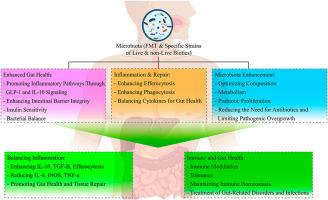Modulation of efferocytosis and inflammation resolution by live and non-live probiotics through gut microbiota interactions in preclinical and clinical studies
IF 4.8
1区 农林科学
Q1 FOOD SCIENCE & TECHNOLOGY
引用次数: 0
Abstract
Gut microbiota plays a critical role in maintaining health and is implicated in various diseases. Probiotics, prebiotics, synbiotics, and postbiotics (PPSPs) are potential therapeutic approaches for modifying the gut microbiota to prevent or treat associated disorders. This modulation influences apoptotic cell clearance (efferocytosis) and inflammation resolution. These processes are vital for immune function and tissue homeostasis. Evidence from animal and human studies indicates that PPSPs can enhance efferocytosis, leading to reduced inflammation and tissue damage. Additionally, PPSPs may ameliorate diseases such as metabolic syndrome, gastrointestinal disorders, and neurodegenerative conditions, by modulating gut microbiota composition and metabolite production. Notably, non-viable probiotics also enhance natural defense against infections, boost vaccine responses, and reduce common cold incidence. Clinical trials show promising outcomes for PPSPs in treating inflammatory bowel disease and certain cancers. However, further research is needed to determine the specific strains, dosages, and durations of PPSPs for optimizing their therapeutic efficacy. Overall, modulating gut microbiota through PPSPs represents a promising avenue for disease prevention and treatment, particularly in enhancing apoptotic cell clearance and attenuating inflammation and tissue damage.

在临床前和临床研究中,通过肠道微生物群相互作用,活的和非活的益生菌调节efferocytosis和炎症消退
肠道菌群在维持健康方面起着至关重要的作用,并与各种疾病有关。益生菌、益生元、合成菌和后益生菌(PPSPs)是改变肠道微生物群以预防或治疗相关疾病的潜在治疗方法。这种调节影响凋亡细胞清除(efferocytosis)和炎症消退。这些过程对免疫功能和组织稳态至关重要。来自动物和人体研究的证据表明,PPSPs可以增强efferocysis,从而减少炎症和组织损伤。此外,PPSPs可以通过调节肠道微生物群组成和代谢物的产生来改善代谢综合征、胃肠道疾病和神经退行性疾病等疾病。值得注意的是,非活菌还能增强对感染的自然防御,促进疫苗反应,并减少普通感冒的发病率。临床试验显示PPSPs在治疗炎症性肠病和某些癌症方面有希望的结果。然而,为了优化PPSPs的治疗效果,还需要进一步的研究来确定PPSPs的具体菌株、剂量和持续时间。总的来说,通过PPSPs调节肠道微生物群代表了疾病预防和治疗的有希望的途径,特别是在增强凋亡细胞清除和减轻炎症和组织损伤方面。
本文章由计算机程序翻译,如有差异,请以英文原文为准。
求助全文
约1分钟内获得全文
求助全文
来源期刊

Food Bioscience
Biochemistry, Genetics and Molecular Biology-Biochemistry
CiteScore
6.40
自引率
5.80%
发文量
671
审稿时长
27 days
期刊介绍:
Food Bioscience is a peer-reviewed journal that aims to provide a forum for recent developments in the field of bio-related food research. The journal focuses on both fundamental and applied research worldwide, with special attention to ethnic and cultural aspects of food bioresearch.
 求助内容:
求助内容: 应助结果提醒方式:
应助结果提醒方式:


